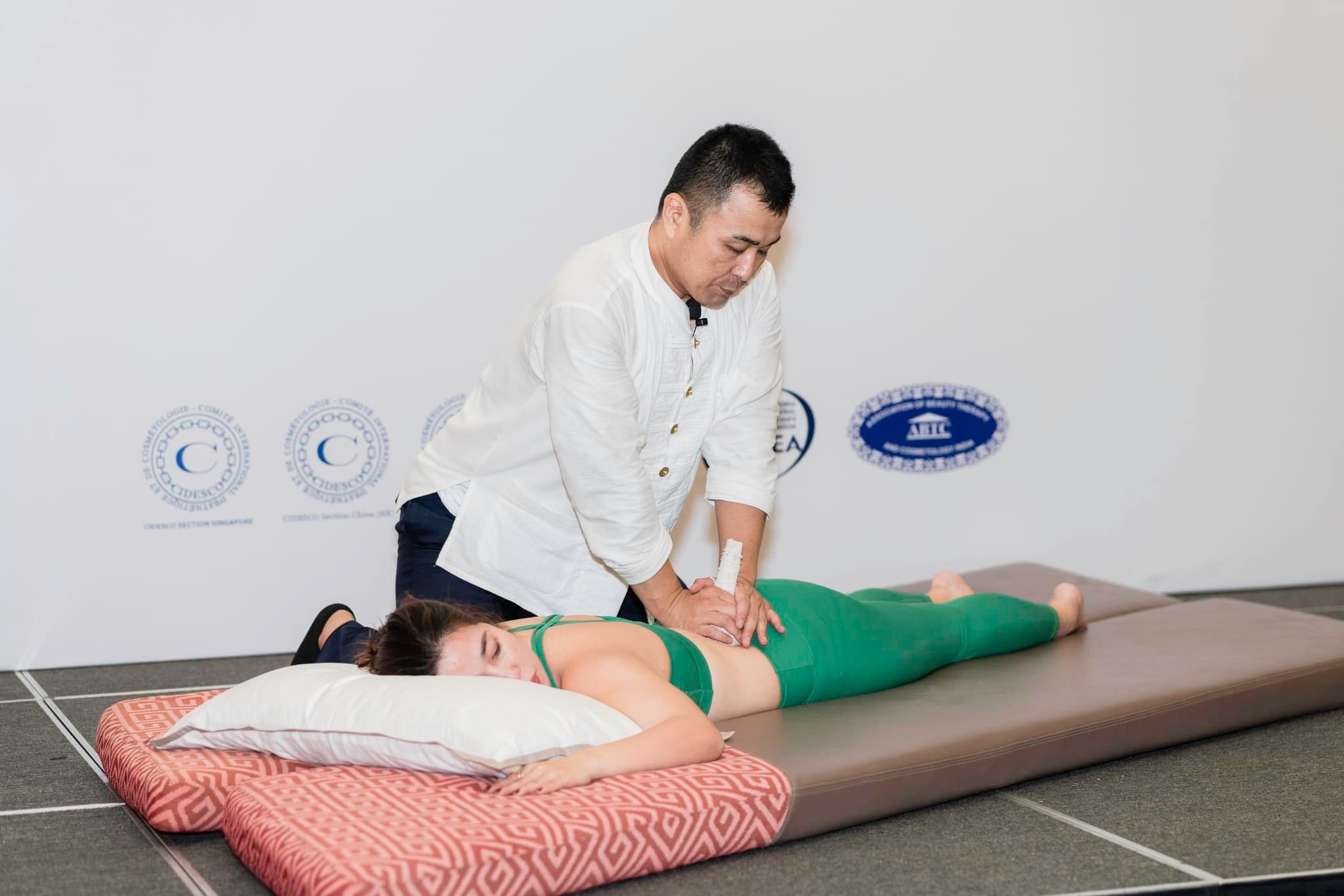Although still quite new in Vietnam, Yoga Therapy is gradually becoming a trend that many people are interested in, especially those who love Yoga and want to improve their overall health. However, many people still wonder about this type: What is Yoga Therapy? How is it different from traditional Yoga? And is learning Yoga Therapy really necessary?
Let’s find out more details with Vo Dung International Academy right below!
What is a Yoga Therapy Course?

The trend of natural and holistic health care is gradually becoming a popular lifestyle, in which Yoga therapy is increasingly popular thanks to its ability to combine exercise, relaxation and therapy. Yoga therapy courses not only help learners improve their health but also open up opportunities to develop their careers as professional trainers.
So, what exactly is Yoga Therapy?
According to experts, Yoga Therapy is a practice method that combines traditional Yoga and modern medical knowledge. Yoga Therapy courses provide an in-depth foundation in body mechanics, how to apply Yoga movements to support the treatment of health problems such as back pain, stress, insomnia, or chronic diseases. Not only focusing on the physical, Yoga Therapy also aims to balance the mind and improve the overall quality of life.
3 Benefits of Taking a Yoga Therapy Course

In modern life, physical and mental health are increasingly concerned, especially natural, safe and sustainable methods. Yoga therapy courses fully meet these criteria, bringing 3 practical benefits to individuals and the community.
Improve physical and mental health
- Reduce stress, improve mental health: Yoga therapy exercises combine breathing, movement and meditation to help reduce stress, improve mood, bring a sense of peace and balance in life.
- Improve physical health: Practicing yoga therapy helps improve flexibility, strengthen muscles, reduce chronic pain problems and improve overall health.
- Support treatment of diseases: Yoga therapy is specially designed to support the treatment of diseases such as back pain, sleep disorders, high blood pressure, helping participants restore their health naturally.
Develop professional skills
- Mastering in-depth knowledge: The course provides comprehensive knowledge of anatomy, psychology and treatment methods suitable for each subject.
- Teaching Skills Mastery: Participants are well trained to confidently instruct and conduct professional Yoga Therapy classes.
- Highly practical application: Students learn how to design personalized therapy programs that meet the diverse needs of students and clients.
International career opportunities
- High demand globally: Yoga therapy is a rapidly growing field, popular in many countries, opening up job opportunities in an international environment.
- Attractive and stable income: With skills and certificates from the course, students can achieve high income when working at yoga centers, spas, or opening private teaching classes.
- Join an international community of experts: The course not only provides knowledge but also helps students connect with leading experts, expand their networks and develop their careers.
Yoga Therapy course is not only a journey to improve health but also the key to open up promising opportunities for personal development and career.
Steps to Join and Complete a Yoga Therapy Course

To join and successfully complete the Yoga Therapy course, you need to follow these steps:
Step 1: Search and choose the right course
- Training quality: Choose courses from reputable centers, recognized by international Yoga organizations.
- Experienced Teachers: Choose courses with experienced, highly qualified and dedicated teachers.
- Appropriate for the purpose: Ensure course content meets learning objectives, from basic to advanced, including both theoretical knowledge and practical skills.
Step 2: Prepare before the course
- Register early: Complete registration procedures and confirm course participation by the deadline.
- Prepare tools: Prepare necessary tools such as yoga mat, comfortable clothes, notebook and study materials.
- Willingness: Practice a positive learning attitude, be ready to receive new knowledge and be patient during the learning process.
Step 3: Attend all classes
- Theory: Master the basic knowledge of anatomy, psychology and therapeutic principles in Yoga.
- Practice regularly: Attend all practice sessions to hone your technique, improve your personal skills and coaching abilities.
- Q&A and Discussion: Actively participate in discussions, ask questions to the instructor to gain a deeper understanding of the treatment methods.
Step 4: Complete the test and practice
- Theory test: Take a theory test to assess your level of understanding of the knowledge you have learned.
- Teaching Practice: Complete sample teaching practice sessions to improve confidence and instructional skills.
- Get feedback: Get feedback from instructors and peers to improve and perfect your skills.
Step 5: Get certified and apply knowledge
- Certificate of Completion: Receive a certificate after fully meeting the theoretical and practical requirements of the course.
- Practical application: Use the knowledge and skills learned to conduct Yoga Therapy classes or support individuals in need of therapy.
- Keep learning: Always learn and update new trends in the field of Yoga therapy to continuously develop yourself.
By following the above steps, you will not only complete the Yoga Therapy course with excellence but also be ready to apply the knowledge into practice to benefit the community.
Notes when learning and working with Yoga therapy
Ensuring safety and effectiveness
To achieve optimal results when practicing and instructing Yoga Therapy, it is important to first understand your own and your students’ limits. A solid understanding of anatomy, recovery mechanisms, and appropriate therapeutic exercises will help you develop a safe and effective lesson plan. At the same time, don’t forget to monitor and listen to feedback from students to adjust your methods accordingly.
Continuously update professional knowledge
Yoga therapy is a constantly evolving field. So, be proactive and attend workshops, seminars, or advanced courses to stay up to date with current trends and techniques. Learning from experienced professionals will help you improve your skills and broaden your perspective in this field.
Building a professional attitude and work mentality
As a Yoga Therapeutic Instructor, dedication and support are key to building trust with your students. Always listen and accompany them on their journey to improve their health. A positive, open and patient attitude will not only make you a good instructor but also motivate students to stick around and progress long-term.
Consider studying and working with Yoga Therapy not only as a career but also as a journey of continuous learning, connection and spreading healing values to the community!







Bài viết liên quan
Spa Franchise Process in Detail: Everything You Need to Know
Mục lụcWhat is a Yoga Therapy Course?3 Benefits of Taking a Yoga Therapy CourseImprove physical and mental[...]
What is the difference between a franchise spa and a traditional spa? Answering all your questions
Mục lụcWhat is a Yoga Therapy Course?3 Benefits of Taking a Yoga Therapy CourseImprove physical and mental[...]
Spa Franchise Agreement: Everything You Need to Know
Mục lụcWhat is a Yoga Therapy Course?3 Benefits of Taking a Yoga Therapy CourseImprove physical and mental[...]
Spa Franchising: Golden Opportunity or Potential Risk?
Mục lụcWhat is a Yoga Therapy Course?3 Benefits of Taking a Yoga Therapy CourseImprove physical and mental[...]
Spa Franchise Costs 2024: How Much Is Enough to Start?
Mục lụcWhat is a Yoga Therapy Course?3 Benefits of Taking a Yoga Therapy CourseImprove physical and mental[...]
What is spa franchising? Discover the most effective spa business opportunity
Mục lụcWhat is a Yoga Therapy Course?3 Benefits of Taking a Yoga Therapy CourseImprove physical and mental[...]